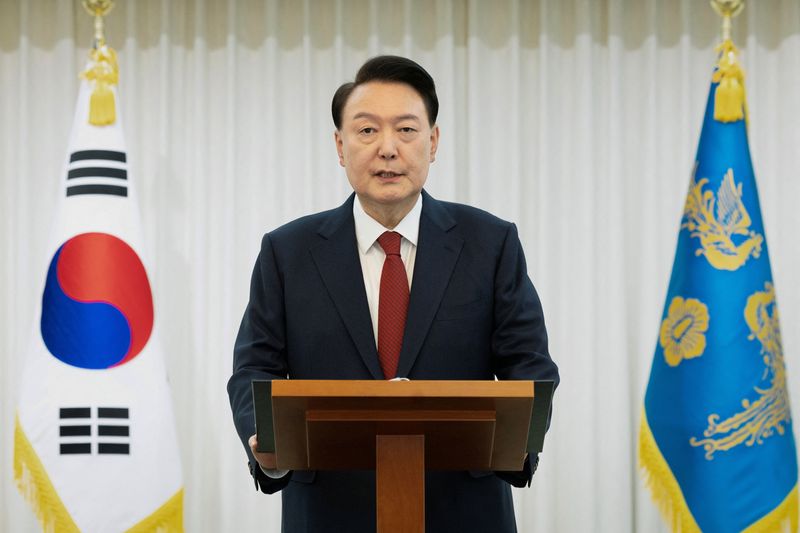By Hyonhee Shin
SEOUL (Reuters) - South Korean President Yoon Suk Yeol, several cabinet ministers, military commanders and police officials face indictments and criminal investigations over the president's short-lived martial law declaration on Dec. 3.
Yoon, who has been impeached, also faces a trial in the Constitutional Court that will decide whether to confirm his ouster from office or restore his presidential powers.
A South Korean court granted an arrest warrant for Yoon on Tuesday in a separate criminal investigation, the first time ever for a sitting president in the country.
Prosecutors, the police and the Corruption Investigation Office for High-ranking Officials (CIO) have begun indicting some of the top military officials being probed on charges of insurrection and abuse of power, among others.
Here is what we know about the criminal investigations so far:
WHO IS FACING CHARGES?
Yoon has not been indicted and has not been served with the arrest warrant yet. But his former defence minister Kim Yong-hyun has been arrested and indicted for alleged insurrection and abuse of power.
Chiefs of the Capital Defence Command and the Defence Counterintelligence Command have also been indicted as of Tuesday.
Others involved in the case include former interior minister Lee Sang-min and army chief Park An-su, who was named martial law commander, the army's Special Warfare Command as well as several other military generals and senior police officials, including the national and Seoul police chiefs, who are accused of playing a role in the martial law plan.
Prime Minister Han Duck-soo, who was impeached by the main opposition Democratic Party on Friday, is also being questioned over his role in failing to block Yoon's martial law.
Yoon, Kim, Lee, the national and Seoul police chiefs and more than 10 military commanders have been banned from leaving the country.
The Seoul Western District Court granted the CIO's request for a warrant to arrest Yoon as well as a search warrant for his residence.
It was unclear how or when the warrants against Yoon will be executed. Previously, Yoon has failed to respond to multiple summons by investigative authorities for questioning, and attempts to search the presidential office have been repeatedly blocked by the presidential security service.
WHO LEADS THE INVESTIGATIONS?
The Supreme Prosecutors' Office has created a special investigation bureau to examine the case for the first time since it probed a 2016 corruption scandal engulfing then-President Park Geun-hye, who was impeached and eventually ousted.
The team consists of some 50 prosecutors and investigators, and about a dozen military prosecutors have also been drafted in, its head Park Se-hyun said.
The national police agency has also confirmed the launch of its investigation, which Yonhap news agency said includes some 150 officers and investigators.
The CIO separately opened an investigation after receiving complaints about national police chief Cho Ji-ho and other senior police officials.
The defence ministry also has officials probing the matter. Such different agencies are working together under the name of "joint investigative unit", but Yoon's legal counsel has claimed that the probes by different agencies remain disjointed and overlapping.
Parliament has passed bills for the appointment of special counsels to spearhead a collective investigation with support from other agencies, but the bills have not yet been approved by an acting president.
WHAT CHARGES ARE SOUGHT?
The officials face potential charges of insurrection, abuse of authority and obstructing other people from exercising their rights.
If convicted, the crime of leading an insurrection is punishable by death or life imprisonment, with or without prison labour. For those who engaged in activities key to the insurrection, punishment could range from death to life imprisonment down to imprisonment without prison labour for at least five years. People who merely joined in the plot or violence face imprisonment, with or without prison labour, for less than five years.

Abuse of authority brings penalties of imprisonment for less than five years or fines of up to 10 million won ($7,000), while obstructing other people's rights is punishable by a prison term of less than five years or fines of up to 7 million won.
South Korea last handed down a death sentence in 2016, but has not executed anyone since 1997.
